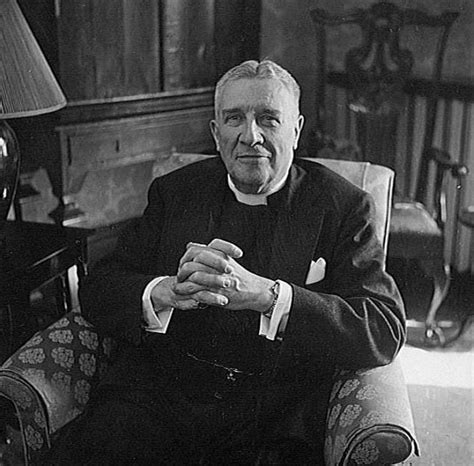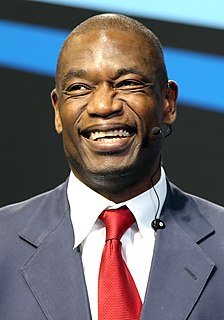A Quote by Lee Strobel
So much of the world's suffering results from the sinful action or inaction of ourselves and others. For example, people look at a famine and wonder where God is, but the world produces enough food for each person to have 3,000 calories a day. It's our own irresponsibility and self-centeredness that prevents people from getting fed.
Related Quotes
Let us face at the outset how many Christians are not victorious, but defeated. Defeated by circumstances, defeated by other peoples? natures and wrong-doings, defeated by the down-drag of the flesh, defeated by loss, by pain, by suffering, by worry. Instead of saying with confidence, ?This is the victory that overcometh the world, even our faith?, they have to say in honesty, ?This is the defeat that has been caused by the world, even our self-centeredness.? That is the opposite of faith. Unbelief is not the opposite of faith; self-centeredness is ? being centered in self rather than in God.
I don't think the world is the way we like to think it is. I don't think it's one solid world, but many, thousands upon thousands of them--as many as there are people--because each person perceives the world in his or her own way; each lives in his or her own world. Sometimes they connect, for a moment, or more rarely, for a lifetime, but mostly we are alone, each living in our own world, suffering our small deaths.
Some might say that looking inside of ourselves for spiritual truths is egocentric and selfish, and that egolessness and selflessness lie in working for others in the world. But until we find our inner truth, our work in the world will always revolve around our 'selves'. As long as we think about the world in terms of 'self' and 'others', our actions will be selfish. Our 'self' follows us wherever we go, so positive results will be limited.
God has made us humans in God's own image. So therefore the highest way to talk about God is by some kind of analogy with ourselves. So, naturally, if we who are finite and sinful suffer in multiple ways because of sin and evil and the horrible things that happen in our world, how much more does God, who is infinite, sinless, and knows the totality of all that happens to everybody, suffer pain and heartache at the suffering of his human and non-human creation - and be angry at all that causes it?
Self-absorption in all its forms kills empathy, let alone compassion. When we focus on ourselves, our world contracts as our problems and preoccupations loom large. But when we focus on others, our world expands. Our own problems drift to the periphery of the mind and so seem smaller, and we increase our capacity for connection - or compassionate action.
God's revelation... unmasks our illusions about ourselves. It exposes our pride, our individualism, our self-centeredness - in short, our sin. But worship also offers forgiveness, healing, transformation, motivation, and courage to work in the world for God's justice and peace - in short, salvation in its largest sense.
You are a child of God, small games do not work in this world. For those around us to feel peace, it is not example to make ourselves small. We were born to express the glory of God that lives in us. It is not in some of us, it is in all of us. While we allow our light to shine, we unconsciously give permission for others to do the same. When we liberate ourselves from our own fears, simply our presence may liberate others.
Immensity is always there, but we so often become numb to it, or deceive ourselves into thinking our own lives and selves are what's large. Step into the ocean or walk on Mount Tamalpais, and that kind of amnesia and self-centeredness isn't possible. Enter the natural world at all, you see existence emerge, ripen, fall and continue, and you can't help but feel more tender towards self and others. That summoning into the large and the shared is what poems exist also to do.
Adolescents, for all their self-involvement, are emerging from the self-centeredness of childhood. Their perception of other people has more depth. They are better equipped at appreciating others' reasons for action, or the basis of others' emotions. But this maturity functions in a piecemeal fashion. They show more understanding of their friends, but not of their teachers.
Brothers, you came from our own people. You are killing your own brothers. Any human order to kill must be subordinate to the law of God, which says, 'Thou shalt not kill'. No soldier is obliged to obey an order contrary to the law of God. No one has to obey an immoral law. It is high time you obeyed your consciences rather than sinful orders. The church cannot remain silent before such an abomination. ...In the name of God, in the name of this suffering people whose cry rises to heaven more loudly each day, I implore you, I beg you, I order you: stop the repression.
Self-centeredness will bring on the destruction of our world. National pride separates people. All people need the same thing. When you really get down to it, you'll find that all people need good food, clean water, clean air, and a decent environment, meaning education as to how to relate to one another and to avoid conflict, how to accept the differences where different people draw different conclusions.


































